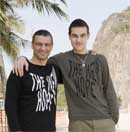Today, it’s all about “Pékin Express, the Inca Trail,” which kicks off on M6 tonight at 8:50 PM. The goal for each leg: to travel between 300 and 1,000 kilometers in three days with one Euro per day per person. Stéphane Rotenberg’s interview is the first article in a series that will follow the adventure of the two contestants from Nice each week until their elimination or victory.
Nice-Premium: Can you introduce us to Season 3 of Pékin Express?
Stéphane Rotenberg: We’ll be traveling from one ocean to another along the Inca trail. We’re starting from the Bay of Rio de Janeiro in Brazil on the Atlantic coast, and the competitors have forty-five days to reach the Pacific in Lima with one Euro per day per person. Their journey will take them through Brazil, Bolivia, and Peru.
N-P: Why South America for this new season?
S.R.: We had started working on a third season in Asia, we were well advanced since the route was already mapped out. But many people on the team, including myself, wanted a radical change. The goal was to go completely somewhere else, to meet new cultures, to see different things. Latin America is a challenging destination because there are far fewer people, so it’s tougher for the contestants to make progress. They crossed through stunning but barren landscapes.
N-P: How do you prepare for a season?
S.R.: It’s almost a year of work. We scout the route under the same conditions as the contestants, which means we ask people to hitchhike the route to see if it’s feasible. Then, there are key cities we definitely want to include like La Paz, Brasilia, and Machu Picchu, so we plan the route based on the expected hitchhiking capability of the contestants. This year, we have a lot of mountain roads, so the course is shorter in terms of kilometers (8,000 compared to 10,000 last year) but we have the Andes Mountains, a big challenge, which slowed the progress significantly.
N-P: You hosted the show in Asia. What are the differences this time?
S.R.: South Americans are naturally less reserved, more talkative than Asians. Also, for Bolivians and Peruvians, they descend from very ancient civilizations, who speak little Spanish but Quechua and other Inca languages. The wild nature is also different from Asia. We skirted the Amazon, crossed the Pantanal, which is the world’s largest swamp, and incredible deserts.
N-P: In Brazil, they speak Portuguese, in Bolivia and Peru, it’s Spanish. Was speaking these languages a selection criterion?
S.R.: It’s true that these two languages are more familiar than Mandarin or Hindi. So, we knew they’d be less lost and manage better. It amazed me to see how quickly they learned basic phrases they didn’t know at the start. Some spoke very good Spanish right from the beginning, but we couldn’t prevent that, especially those who lived in the South. The Belgian contestant also had a very good level in this language. We really gained in the adventure because they were able to interact a lot with people, especially in the evenings at the end of the stages. They could have real big moments of encounter, unlike in China or India where they would communicate with signs.


